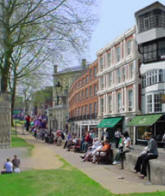Study Mathematics and Science
The Department of Mathematics and Science Exeter College
The Department of Mathematics
and Science is one of five departments within the Sixth at Exeter
College It provides a range of GCSE's and A levels (AS & A2) in
mathematics and science; the BTEC First Diploma in Science and a BTEC
National Diploma in Forensic Scienc, as well as a Science Access to HE
course. The college's International Baccalaureate programme is also
managed from the department.
Exeter College is one of the few
centres in the South West providing the International Baccalaureate,
which over the years been extremely successful, and in the last academic
year produced the highest achievements for four years. The IB provides a
prestigious alternative to either of the A level academic or General
Diploma vocational routes. The International Baccalaureate was born of
efforts to establish a common curriculum and university entrance
qualification for students moving from one country to another.
International educators were motivated by practical considerations and
also by an idealistic vision. They believed that students should share
academic experience that would emphasise critical thinking,
inter-cultural understanding and exposure to a variety of points of
view. They anticipated today's global economics, mass international
travel and the breaking down of traditional, national barriers. The
International Baccalaureate Organisation's [IBO] Diploma Programme was
established in 1968 in Geneva. It is a demanding pre-university course
for able, highly motivated students aged 16 to 19. The IB Diploma has
earned a reputation for rigorous assessment, giving successful students
access to the world's leading universities. The programme's grading
system is criterion referenced, meaning that each student's performance
is measured against clearly defined levels of achievement. These
standards are consistent from one examination session to the next and
are applied to all schools and colleges across the world. 2004 was a
year of outstanding success for IB students at Exeter College, 45
students completed the IB programme last year, with an overall pass rate
of 90% compared with a world pass rate of 84% in 2004. Many students
gained outstanding individual points scores out of a maximum of 45
points. 45% of Exeter College students achieved 35 points or above,
compared with 22% worldwide. The highest individual score was 42
points, placing that student in the top 2% in the world! 21% of
students in Exeter achieved 40 points or more, which is the threshold
for entry to the Universities of Oxford and Cambridge. These successes
demonstrate that Exeter is an ideal location in which to offer the IB.
We are able to attract a cohort of articulate, able students with an
international perspective and an aspiration to study a wide range of
subjects, as well as wanting to participate in creative, physical and
community based project work. For students such as these, the IB is
definitely the right course for a bright future at university and
beyond.
The department also delivers
several AS/A2 and GCSE evening classes. The college is the sole provider
of evening classes in Chemistry and Physics in the region and A level
Human Biology and Maths one-year 'Fast Track'. A significant amount of
servicing work, particularly in Mathematics is carried out in other
departments and on other sites. Pass rates and retention are high with
benchmarks exceeded in many subjects.
There are
currently 318 students in Tutor Groups in the department, Tutorial work
is directed at the academic and pastoral care of students and conforms
to a range of college policies. Key Skills are delivered in taught
groups across the college with the department being responsible for
Application of Number at levels 1, 2 and 3.
Recent developments in the department include
the introduction of a range of mathematics qualifications at level 1 and
2, enabling progression from basic numeracy to GCSE. An ongoing
upgrading of the department's facilities is also in progress.The
level 2 provision in science has been reviewed over the last year with
the object of increasing the programme choice available and the BTEC
First Diploma in Science has been successfully introduced.
There are currently 25 full-time
permanent lecturing staff and three Associate Lecturers working in the
department based in four curriculum teams: Maths, Physics, Chemistry and
Earth Sciences.
Request Information:
| |

|


